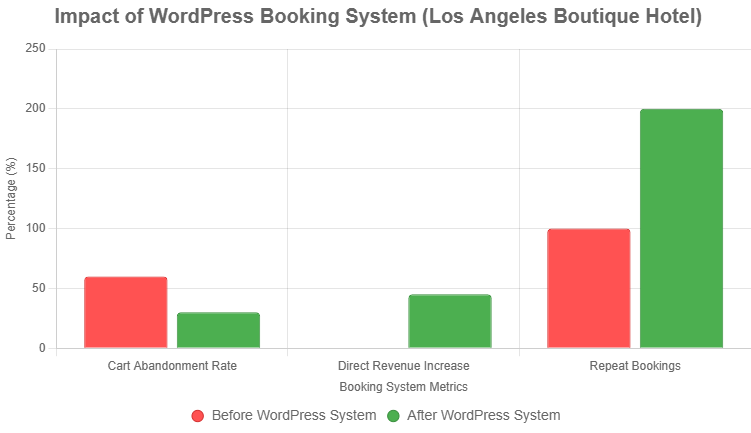How Hotels Lose Guests Without an Easy-to-Use WordPress Booking System?
The Guest Who Never Booked
Imagine a traveler named Sarah. She’s on her phone at midnight, looking for a boutique hotel in San Diego. She lands on two sites:
-
Hotel A: A sleek, WordPress-powered booking system where she selects dates, sees available rooms, and pays in under two minutes.
-
Hotel B: A confusing form buried under three clicks, slow to load, with no instant confirmation.
Where does Sarah book? You already know the answer.
Every day, hotels lose potential guests like Sarah not because the rooms aren’t beautiful, not because the service isn’t exceptional, but because their website booking system is clunky, outdated, or just plain unusable.
Why Hotels Lose Guests Without an Easy-to-Use WordPress Booking System
The hospitality industry runs on speed and trust. When booking is hard, guests abandon. When it’s easy, they convert.
- 70% of travelers say they’ll leave a site if the booking takes too many steps
- Mobile-first design is non-negotiable, with more than half of bookings happening on smartphones
- Trust signals like instant confirmation and secure payment matter more than discounts
Hotels that fail at this lose direct bookings, push potential guests to third-party platforms, and ultimately cut into their margins.
Don’t let bad booking systems drain your revenue.
Call 619-724-9517, email info@zeorbit.com, or visit www.zeorbit.com to build a guest-friendly booking flow.

The Real Cost of a Bad Booking Experience
A difficult booking process isn’t just a website issue, it’s a business issue.
- Revenue leakage: Guests choose OTAs like Booking.com or Expedia instead
- Lower brand loyalty: Guests trust the OTA, not your hotel’s own website
- Lost SEO advantage: Without an integrated WordPress Web Builder Solution, your site underperforms on Google
- Higher marketing costs: You end up paying commissions instead of owning the booking pipeline
WordPress: The Scalable Fix for Hotels
WordPress, paired with modern booking plugins and Web Development expertise, delivers what hotels need most:
- Simple UX: One-page booking, fewer clicks, higher conversions
- Custom branding: No generic templates, your hotel looks unique
- Scalable systems: From boutique stays to multi-location chains
- SEO-ready infrastructure: Stronger visibility with Nationwide SEO and Blog SEO
| Feature | Outdated Booking System | WordPress Booking System |
|---|---|---|
| Mobile Usability | Poor | Optimized |
| Direct Revenue | Low | High |
| Guest Trust | Weak | Strong |
| OTA Dependence | High | Reduced |
A Hotelier’s Wake-Up Call
One boutique hotel in Los Angeles thought its website was “good enough.” Then they analyzed bookings:
- 60% abandoned carts on their booking form
- Average session time under 40 seconds
- Guests emailing to confirm reservations manually
After switching to a WordPress-powered booking system, abandonment dropped, revenue rose 45%, and repeat bookings doubled. Guests stopped saying, “I couldn’t figure out your website.”
How Hotels Can Fix This Fast
- Audit your current booking flow with SEO Development
- Implement a modern, mobile-first WordPress booking plugin
- Integrate AI-powered insights with AI Consulting Strategy
- Optimize for local discovery with Local SEO
- Showcase results and stories in your Portfolio
If your booking system isn’t helping you win guests, it’s costing you.
Call 619-724-9517, email info@zeorbit.com, or get started at ZeOrbit.
FAQs
Why do guests abandon hotel booking sites?
Because the process is too long, confusing, or not mobile-friendly. A streamlined WordPress booking system solves this.
Can WordPress booking systems handle multiple hotels or chains?
Yes. With custom Enterprise SEO and scalable frameworks, WordPress can manage multiple properties.
Are OTAs still necessary if I have my own system?
Yes, for visibility. But a strong WordPress booking site reduces OTA dependence and saves on commission fees.
How fast can hotels see results after upgrading their booking system?
Most hotels notice fewer abandoned bookings and higher direct revenue within 30 to 60 days.


